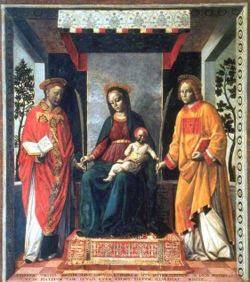
Feastday: February 15
Patron: of Brescia
Death: 120
Faustinus and Jovita were brothers, nobly born and natives of Brescia. All the incidents in their reputed "Acts" are of doubtful authority, and we can only be sure of their names and martyrdom. According to the tradition of Brescia, they preached Christianity fearlessly while their bishop lay in hiding. Their zeal excited the fury of the heathens against them, then they were arrested by a heathen lord called Julian. They were tortured and dragged to Milan, Rome and Naples, and then brought back to Brescia. As neither threats nor torments could shake their constancy, the Emperor Hadrian, who happened to be passing through Brescia, commended them to be beheaded. The city of Brescia honors them as its chief patrons and claims to possess their relics. On April 18 the Roman Martyrology names the martyr St. Calocerus, who figures largely in the legendary history of St. Faustinus and Jovita, whose heroic confession he is said to have witnessed when, as a court official, he accompanied Hadrian to his native city Brescia and was present in the amphitheatre. The constancy of the two confessors and the refusal of the wild beasts to touch them brought about his conversion, and he was baptized by Bishop Apollonius with twelve thousand other citizens. He was tortured and imprisoned in several Italian towns notably in Asti, where he instructed St. Secundus who visited him in gaol. Eventually, we are told, he was taken to Albanga in Liguria and beheaded on the seashore. Their feast day is February 15.
To all our readers, Please don't scroll past this.
Today, we humbly ask you to defend Catholic Online's independence. 98% of our readers don't give; they simply look the other way. If you donate just $5.00, or whatever you can, Catholic Online could keep thriving for years. Most people donate because Catholic Online is useful. If Catholic Online has given you $5.00 worth of knowledge this year, take a minute to donate. Show the volunteers who bring you reliable, Catholic information that their work matters. If you are one of our rare donors, you have our gratitude and we warmly thank you. Help Now >Saints Jovita and Faustinus were said to be Christian martyrs under Hadrian. Their traditional date of death is 120. They are patron saints of Brescia.
"Jovita" in modern times is a woman's name. In some accounts the saints were instead Jovinus and Faustinus, brothers.
Traditional vita
Tradition states that they were members of a noble family of Brescia in Lombardy (northern Italy). Jovinus, the older brother, was a preacher; Faustinus, a deacon. For their fearless preaching of the Gospel, they were arraigned before the Roman Emperor Hadrian, who at Brescia, Rome and Naples, subjected them to frightful torments, after which they were beheaded at Brescia in the year 120, according to the Bollandists, though Allard (Histoire des Persécutions pendant les Deux Premiers Siècles, Paris, 1885) places the date as early as 118.
Saint Faustinus of Brescia, a bishop of Brescia and an alleged descendant, compiled their Acts.
Doubts and veneration
The many "Acts" of these saints are chiefly of a legendary character. The Jesuit Fedele Savio questioned nearly every fact related of them except their existence of the martyrdom, which are too well attested by their inclusion in so many of the early martyrologies and their extraordinary cult in their native city, of which from time immemorial they have been the chief patrons.
Their common feast day on 15 February, the traditional date of their martyrdom, was inserted into the General Roman Calendar . It was removed in 1969, because their "Acts are completely fabulous, treating Jovita as a preacher, although she was a woman and a man was Faustinus." However modern minds tend to forget that the name Jovita or Giovita was a man's name in the pre-Christian and early Christian era. Savio highlights that the saints are not to be identified with the fabulous figures in the Acts. The two saints remain listed in the Roman Martyrology, the official, through professedly incomplete, list of the saints recognized by the Catholic Church. The cities of Rome, Bologna and Verona share with Brescia possession of their relics.
A lake partially in the town of St. Leo, Florida has been called Lake Jovita since its discovery by Judge Edmund F. Dunne on February 15, 1882. The nearby community of San Antonio changed its name to Lake Jovita in 1927 before reverting in 1933.
Modern tradition considers Faustine's day as the anti-Valentine's Day. This is why (mostly in southern Europe) single people celebrate on 15 February.





